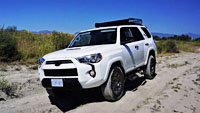
Want to drive an icon? Or maybe you’re just satisfied with a car-based crossover that’s little more than a tall station wagon with muscled-up, matte-black fender flares? I thought not. You wouldn’t be here if you merely wanted a grocery-getter, unless those groceries happen to necessitate a fly rod or hunting rifle to acquire.
Toyota’s 4Runner is idea for such excursions, and makes a good family shuttle too. I’d call it a good compromise between city slicker and rugged outdoorsman, but it’s so amazingly capable off-road it feels like you’re not compromising anything at all, despite having such a well put together interior, complete with high-end electronics and room to spare.
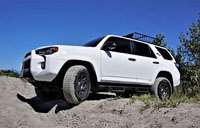
To be clear, I’m not trying to say the 4Runner is the most technically advanced 4×4 around, because it’s actually somewhat of a throwback when it comes to mechanicals. Under the hood is Toyota’s tried and true 4.0-litre V6 that’s made 270 horsepower and 278 lb-ft of torque since 2010, when this particular 4Runner generation arrived on the scene. That engine was merely an update of a less potent version of the same mill, which was eight years old at the time. The five-speed automatic it’s still joined up with hails from 2004, so mechanically the 4Runner is more about wholly proven reliability than leading edge sophistication, resulting in one of the more dependable 4x4s currently available, as well as best in the “Mid-size Crossover/SUV” class resale value according to The Canadian Black Book’s 2019 evaluation. Still, while the 4Runner might seem like a blast to the past when it comes to mechanicals, this ends as soon as we start talking about off-road technologies.
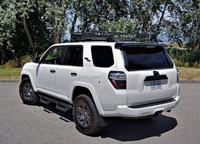
I’m not talking about the classic second shift lever that sits next to the auto shifter on the lower centre console, this less advanced than most other 4x4s on the market that simply need the twist of a dash- or console-mounted dial to engage their four-wheel drive systems’ low ratio gears. The 4Runner’s completely mechanical setup first takes a tug rearward to shift it from H2 (rear-wheel drive) to H4 (four-wheel drive, high), which gives the SUV more traction in inclement weather or while driving on gravel roads, but doesn’t affect the speed at which you can travel. You’ll need to push the same lever to the right and then forward in a reverse J-pattern when wanting to venture into the wild yonder, this engaging its 4L (four-wheel drive, low) ratio, thus reducing its top speed to a fast crawl yet making it near invincible to almost any kind of terrain thrown at it.
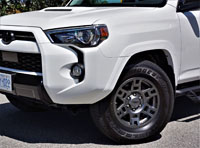
My test trail of choice featured some deeply rutted paths of dried mud, lots of soft, slippery sand, and plenty of loose rock and gravel, depending on the portion of my short trek. For overcoming such obstacles, Toyota provides its Active Trac (A-TRAC) brake lock differential that slows a given wheel when spinning and then redirects engine torque to a wheel with traction, while simultaneously locking the electronic rear differential. The controls for this function can be found in the overhead console, which also features a dial for engaging Crawl Control that maintains a steady speed without the need to have your right foot on the gas pedal. This means you’re free to “stand” up in order to see over crests or around trees that would otherwise be in your way. Crawl Control offers five throttle speeds, while also applying brake pressure to maintain its chosen speed while going downhill.
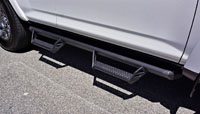
Moving up the 4×4 sophistication ladder is the 4Runner’s Multi-Terrain Select system, which can be dialed into one of four off-road driving modes that range from “LIGHT” to “HEAVY” including “Mud, Sand, Dirt”, “Loose Rock”, “Mogul”, and “Rock”. Only the lightest mud, sand and dirt setting can be used in H4, with the three others requiring a shift to L4.
Fancy electronics aside, the 4Runner is able to overcome such obstacles due to 244 millimeters (9.6 inches) of ground clearance and 33/26-degree approach/departure angles, while I also found its standard Hill Start Assist Control system is as helpful when taking off from steep inclines when off-pavement as it is on the road. In the event you get hung up on something underneath, take some confidence in the knowledge that heavy-duty skid plates will protect the engine, front suspension and transfer case from damage.
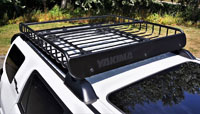
While I personally experienced no problem when it came to ground clearance, my Venture Edition tester came with a set of standard Predator side steps that could get in the way of protruding rocks, stumps or even crests. They hang particularly low, and while helpful when climbing inside (albeit watch your shins), might play interference.
For $55,390 plus freight and fees, the Venture Edition also includes blacked out side mirrors, door handles (that also include proximity-sensing access buttons), a rooftop spoiler, a windshield wiper de-icer, mudguards, and special exterior badges. Inside, all-weather floor mats join an auto-dimming rearview mirror, HomeLink garage door remote controls, a powered glass sunroof, a front and a rear seating area USB port, a household-style 120-volt power outlet in the cargo area, active front headrests, eight airbags, and Toyota’s Safety Sense P suite of advanced driver assistance systems, including an automatic Pre-Collision System with Pedestrian Detection, Lane Departure Alert, Automatic High Beams, and Dynamic Radar Cruise Control. Options not already mentioned include a sliding rear cargo deck with an under-floor storage compartment.
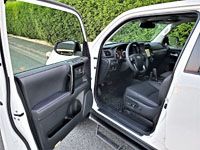
The Venture Edition also features an awesome looking Yakima MegaWarrior Rooftop Basket, which allows for extra cargo carrying capacity on top of the SUV. While really useful for camping trips and the like, it’s tall and can make parking in urban garages a bit tight to say the least. In fact, you may not be able to park in some closed cover parking lots due to height restrictions, the basket increasing the already tall 4Runner Venture Edition’s ride height by 193 mm (7.6 in) from 1,816 mm (71.5 in) to 2,009 mm (79.09 in). The basket itself measures 1,321 millimetres (52 inches) long, 1,219 mm (48 in) wide, and 165 mm (6.5 in) high, so it really is a useful cargo hold when heading out on a long haul.
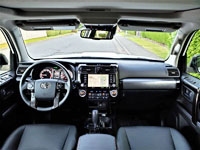
Heading out on the highway in mind, my Venture Edition tester’s 17-inch TRD alloys and 265/70 Bridgestone Dueller H/T mud-and-snow tires did as good a job of managing off-road terrain as they held to the pavement, making them a good compromise for both scenarios. In such situations you’ll no doubt appreciate another standard Venture Edition feature, Toyota’s Kinetic Dynamic Suspension System (KDSS) that reduces body lean by up to 50 percent at high speed. This is important in a body-on-frame SUV that’s primarily designed for off-road, and thus comes with lots of wheel travel and a relatively soft suspension that’s easy on the backside through rough terrain. It’s a heavy beast too, weighing in at 2,155 kg (4,750 lbs), so KDSS really makes a difference on the highway, especially when the road gets twisty and you want to keep up with (and even exceed) the flow of traffic. It’s actually pretty capable through curves thanks to an independent double-wishbone front suspension and a four-link rear setup, plus stabilizer bars at both ends, but don’t expect it to stand on its head like Thatcher Demko did on the Canuck’s recent Vegas Golden Knights’ playoff run, or you’ll likely be hung upside down like the rest of the Vancouver team were when physicality overcame reality.
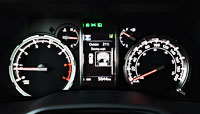
Physicality in mind, the 4Runner’s powered driver seat was very comfortable during my weeklong test, even when off-road. I was able to adjust the seat and tilt/telescopic steering wheel to a near ideal position for my somewhat oddly proportioned long-legged, short-torso five-foot-eight frame, allowing comfortable yet fully controlled operation, which hasn’t always been the case in every Toyota product, and some other brands’ I should add.
It’s also comforting its other four seats, the Venture Edition standard for five occupants while other 4Runner trims offer three rows and up to seven passengers. I’ve tested the latter before, and let’s just say they’re best left to kids or very small adults, although this five-seat model provides plenty of leg, hip, shoulder and head room in every position.
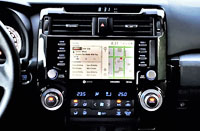
Even without the noted basket on top, the 4Runner provides 1,336 litres (47.2 cu ft) of cargo space behind its second row of seats, which I found more than ample for carrying all my gear. I tested it during the summer so didn’t find reason to use the 20-percent centre pass-through portion of its ultra-handy 40/20/40-split rear seatbacks, but this would be a dealmaker for me and my family due to our penchant for skiing. When all three sections of the rear seat are lowered the 4Runner offers up to 2,540 litres (89.7 cu ft) of max storage, which again is very good, while the weight of said payload can be up to 737 kg (1,625 lbs). Also important in this class, all 4Runners can manage trailers up to 2,268 kg (5,000 lbs) and come standard with a receiver hitch and wiring harness with four- and seven-pin connectors.
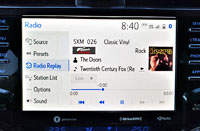
You won’t be able to achieve the 4Runner’s claimed 14.8 L/100km city fuel economy rating when fully loaded with gear and trailer, mind you, or for that matter its 12.5 L/100km highway rating or 13.8 combined estimate. My tester was empty other than yours truly and sometimes one additional passenger, so I had no problem matching its potential efficiency when going light on the throttle and traveling over mostly flat, paved terrain in 2H (two-wheel drive, high). If it seems thirsty to you, consider that it only uses regular fuel and will give you back much of its fuel costs in its aforementioned resale/residual value when it comes time to sell, as well as dependability when out of warranty.
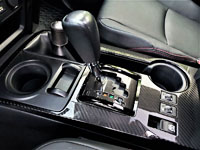
One of the reasons the 4Runner holds its value is lack of change, although Toyota wholly improved this 2020 model’s infotainment system for a much better user experience and lots of advanced features. The 8.0-inch touchscreen incorporates Android Auto, Apple CarPlay, Amazon Alexa and more, while I found its Dynamic Navigation with detailed mapping very accurate. The stock audio system decent as well, standard satellite radio providing the depth of music variety I enjoy (I’m a bit eclectic when it comes to tunes), while the backup camera only offers stationary “projected path” graphic indicators to show the way, but the rear parking sensors made up for this big time. Additional infotainment functions include Bluetooth phone connectivity, a helpful weather page, traffic condition info and apps, meaning that it really lacks nothing you’ll need.
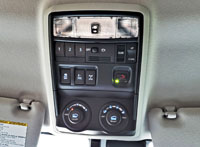
The primary instruments are somewhat more dated in appearances and functionality, but they still do the job. The Optitron analogue dials offer backlit brightness for easily legibility no matter the outside lighting conditions, and the multi-information display in the middle includes the usual assortment of useful features.
My 4Runner Venture Edition interior’s fit, finish and general materials quality was actually better than I expected, leaving me pleasantly surprised. All of its switchgear felt good, even the large dash-mounted knobs, which previously felt too light and generally substandard, are now more solid and robust. Tolerances are tight for the other buttons and switches too, and therefore should satisfy any past 4Runner owner.
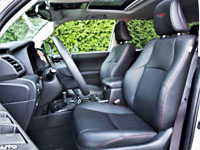
The overall look of the dash and door panels is rectangular, matching the SUV’s boxy exterior style. That will probably be seen as a good thing by most traditionalists, its utilitarian appeal appreciated by yours truly, at least. I was surprised to see faux carbon fibre-style trim on the lower console, and found the dark glossy metallic grey surfacing chosen for the centre stack, dash trim and door panel accents better than shiny piano black plastic when it comes to reducing dust and scratches. Padded and red stitched leatherette gets added to the front two-thirds of those door panels, by the way, the same material as used for the side and centre armrests, while Toyota adds the red thread to the SofTex-upholstered seat side bolsters too, not to mention some flashy red “TRD” embroidery on the front headrests. Again, I think most 4Runner fans should find this Venture Edition plenty luxurious, unless they’re stepping out of a fully loaded Limited model.
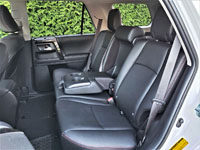
Being that we’re so close to the 2021 model arriving, take note it will arrive with standard LED headlamps, LED fog lights, and special Lunar Rock exterior paint, while new black TRD alloys will soon get wrapped in Nitto Terra Grappler A/T tires for better off-road traction. Additionally, Toyota has retuned the 2021 model’s dampers to improve isolation when on the trail. Word has it a completely new 4Runner is on the way for 2022, so keep this in mind when purchasing this 2020 or one of the upgraded 2021 models.
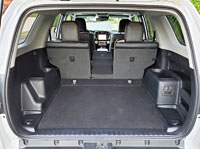
Also worthwhile to keep in mind is Toyota factory leasing and financing on this 2020 4Runner from 3.99 percent, or zero-percent factory leasing and financing on 2019 models if you can locate one. Check out 2019 and 2020 Toyota 4Runner Canada Prices pages to find out more, and remember that a CarCostCanada membership won’t only notify you of available financing and leasing rates, but also provides available rebate information as well as all-important dealer invoice pricing that can save you thousands when negotiating your next new vehicle purchase. Download the free CarCostCanada app from the Apple Store or Google Store to make sure you have all this critical info available whenever you need it. After all, why should you pay more if you don’t have to?
Story and photo credits: Trevor Hofmann
Photo editing: Karen Tuggay
